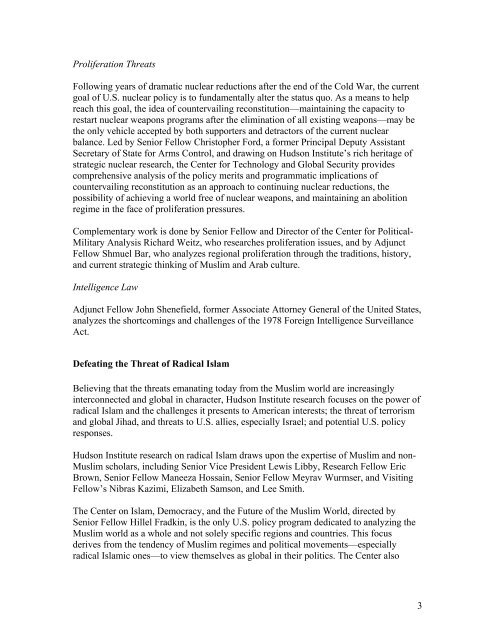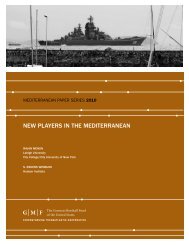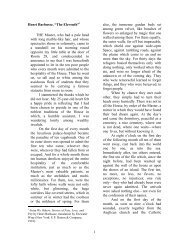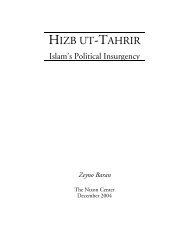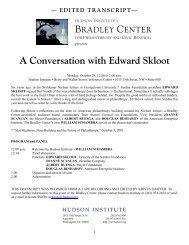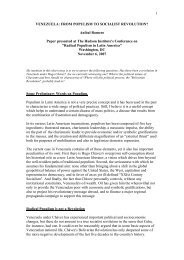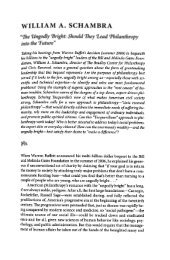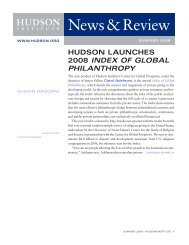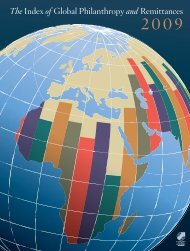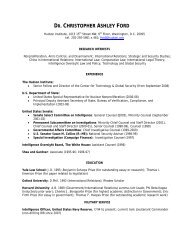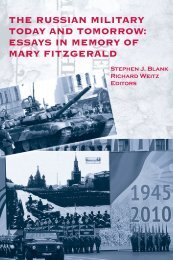Download PDF - Hudson Institute
Download PDF - Hudson Institute
Download PDF - Hudson Institute
Create successful ePaper yourself
Turn your PDF publications into a flip-book with our unique Google optimized e-Paper software.
Proliferation Threats<br />
Following years of dramatic nuclear reductions after the end of the Cold War, the current<br />
goal of U.S. nuclear policy is to fundamentally alter the status quo. As a means to help<br />
reach this goal, the idea of countervailing reconstitution—maintaining the capacity to<br />
restart nuclear weapons programs after the elimination of all existing weapons—may be<br />
the only vehicle accepted by both supporters and detractors of the current nuclear<br />
balance. Led by Senior Fellow Christopher Ford, a former Principal Deputy Assistant<br />
Secretary of State for Arms Control, and drawing on <strong>Hudson</strong> <strong>Institute</strong>’s rich heritage of<br />
strategic nuclear research, the Center for Technology and Global Security provides<br />
comprehensive analysis of the policy merits and programmatic implications of<br />
countervailing reconstitution as an approach to continuing nuclear reductions, the<br />
possibility of achieving a world free of nuclear weapons, and maintaining an abolition<br />
regime in the face of proliferation pressures.<br />
Complementary work is done by Senior Fellow and Director of the Center for Political-<br />
Military Analysis Richard Weitz, who researches proliferation issues, and by Adjunct<br />
Fellow Shmuel Bar, who analyzes regional proliferation through the traditions, history,<br />
and current strategic thinking of Muslim and Arab culture.<br />
Intelligence Law<br />
Adjunct Fellow John Shenefield, former Associate Attorney General of the United States,<br />
analyzes the shortcomings and challenges of the 1978 Foreign Intelligence Surveillance<br />
Act.<br />
Defeating the Threat of Radical Islam<br />
Believing that the threats emanating today from the Muslim world are increasingly<br />
interconnected and global in character, <strong>Hudson</strong> <strong>Institute</strong> research focuses on the power of<br />
radical Islam and the challenges it presents to American interests; the threat of terrorism<br />
and global Jihad, and threats to U.S. allies, especially Israel; and potential U.S. policy<br />
responses.<br />
<strong>Hudson</strong> <strong>Institute</strong> research on radical Islam draws upon the expertise of Muslim and non-<br />
Muslim scholars, including Senior Vice President Lewis Libby, Research Fellow Eric<br />
Brown, Senior Fellow Maneeza Hossain, Senior Fellow Meyrav Wurmser, and Visiting<br />
Fellow’s Nibras Kazimi, Elizabeth Samson, and Lee Smith.<br />
The Center on Islam, Democracy, and the Future of the Muslim World, directed by<br />
Senior Fellow Hillel Fradkin, is the only U.S. policy program dedicated to analyzing the<br />
Muslim world as a whole and not solely specific regions and countries. This focus<br />
derives from the tendency of Muslim regimes and political movements—especially<br />
radical Islamic ones—to view themselves as global in their politics. The Center also<br />
3


